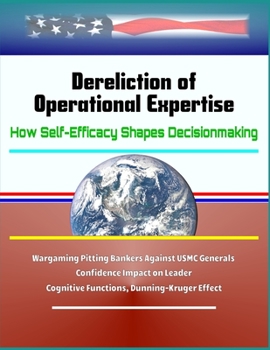Dereliction of Operational Expertise: How Self-Efficacy Shapes Decisionmaking - Wargaming Pitting Bankers Against USMC Generals, Confidence Impact on
In 1995, LtGen(R) Paul Van Riper pitted bankers against U.S. Marine Corps generals in two contests - a stock exchange simulation and a wargame. The venture capitalists won both exercises, beating standing operational leaders that represented decades of deployment and experience. LtGen(R) Van Riper believed that the money managers success stemmed from resiliency and confidence in ambiguous situations. Learning from this failure, the U.S. Army may be able to increase operational leader effectiveness by fostering self-efficacy - confidence - in relation to observed ability.A literature review discusses the doctrine and theory behind how commanders discern the environment, learn as adults, and explains how leaders make rapid decisions during execution. Human subjects research replicates the general aspects of the 1995 wargame, now modified for play between instructors from the U.S. Army Command and General Staff College and civilian recreational board-gamers. Information collected explores the validity of LTG(R) Van Riper's claim while simultaneously measuring confidence levels. The discussion describes the impact of confidence on leader cognitive functions when making rapid decisions. Recommendations provide options on utilizing self-efficacy in leader development.This compilation also includes a reproduction of the 2019 Worldwide Threat Assessment of the U.S. Intelligence Community.Contents: 1. Introduction * 2. Literature Review * Complex Adaptive Systems * Experiential Learning * Naturalistic Decisionmaking * Self-Efficacy * 3. Methodology * Self-Efficacy Survey * Wargame Practicum * 4. Results * Self-Efficacy Survey * Wargame Practicum and Interviews * 5. Discussion * The Dunning-Kruger Effect * The Impostor Phenomenon * 6. Recommendations * Returning Self-Efficacy to Doctrine * Researching to Determine Statistical Significance * 7. ConclusionThis researcher explored the role of self-efficacy, commonly referred to as confidence, in operational decisionmaking while conducting LSCO. Commanding generals will rapid decisions in the age of big data. In future combat, leader self-doubt may contribute to mission failure. Doctrine directs commanders to trust their experiences; however, the same writings provide little insight into evaluating professional judgment and the impact of practice and observation of an individual's skills. In the pursuit of facts supporting self-efficacy concerning judgment and practice, assumptions remain. Human subjects research may dispel some of these assumptions. First, many individuals in the U.S. Army do not believe that operational leaders receive enough repetitions at decisionmaking during training. Semi-structured interviews may confirm this widespread assumption. Next, doctrine assumes leaders automatically execute an additional cognitive step in decisionmaking. After mentally selecting a course of action, leaders must possess enough confidence to translate decision into action. The third assumption presumes the U.S. Army does not provide candid feedback during training events. While the practice is not absent in doctrine, it may not be as frank as required to facilitate holistic leader development. When conducted correctly, frank discussions provide a perspective of one's ability and efficacy.
Format:Paperback
Language:English
ISBN:1701278022
ISBN13:9781701278028
Release Date:January 1
Publisher:Independently Published
Length:84 Pages
Weight:0.48 lbs.
Dimensions:0.2" x 8.5" x 11.0"
Related Subjects
HistoryCustomer Reviews
0 rating





